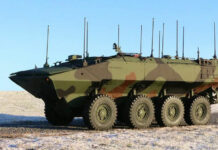
The Army has cancelled the request for proposal process for the Ground Combat Vehicle, delaying the program by about six months. Details about revised rules for a more affordable program are expected within 60 days. Despite the setback, the Army is still hopeful the GCV could be deployed by the year 2017. However, in the near term the service could lose part of the $934 million funding, part of the fiscal 2011 budget request set aside for the development of the GCV prototypes.
The decision followed a report by the Army and Office of Secretary of Defense, Acquisition, Technology and Logistics (OSD/ATL), that evaluated the new vehicle and determined that the service should better prioritize its requirements to better define achievable goals on schedule. Critics in industry have claimed the requirements for the vehicle were set to be too vague as the Army was not in agreement on exactly what the vehicle’s should do. “The refined RfP will result in a vehicle that provides soldiers with critical armored protection in the modern combat environment.” The Army statement said. One of the main concerns about the GCV was that to provide such protection the vehicle weight could increase up to 70 tons.
The announcement comes as the Defense Department prepares for major budget cuts. The GCV program is considered vital for the Army, but since the definition and requirement were too vague from the beginning, the Army finds it difficult to justify committing to a long-term multi-billion dollar program only to replace the Bradley fighting vehicles. The proposed GCV meant much more than just a replacement, it is intended to be a bridge between current warfare and future, networked operations. While different from the cancelled Manned Ground Vehicle (MGV) mainly for political reasons, GCV should be much better protected and survivable, and well equipped to operate in distributed operations, where small units, sometime individual vehicles are empowered to conduct decisive military operations. Modifying current vehicles to perform such missions was found to be too complex.
Three industry teams participated in the program; next month (September) the Army had planned to award contracts to at least two of the three teams, for the development of demonstrator vehicles. These teams competing for these contracts were SAIC-led group with Boeing and Krauss-Maffei Wegmann; a BAE Systems – Northrop team, and a third group led by General Dynamics Land Systems partnered with MTU Detroit Diesel, Lockheed Martin and Raytheon. The development phase of the program is valued at $2.1 billion. The entire program could cost about $40 billion.
More on GCV in the following Defense-Update articles:
U.S. Army Defines Ground Combat Vehicles Priorities
U.S. Army Requests Proposals for a New Ground Combat Vehicle












